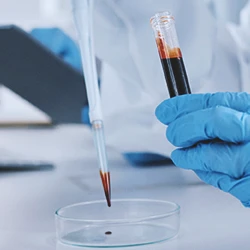If a police officer has pulled you over and detected that you've been drinking, the penalties can be severe. Depending on where you are, if your Blood Alcohol Content (BAC) is .08% or higher, it's considered to be Driving While Intoxicated or Driving Under The Influence.
You may have heard the term BAC being used but don't understand its meaning. As an attorney who worked on several DWI cases, let me tell you what BAC stands for and how the blood alcohol content measured may impact you.
Quick Summary
- An individual's BAC breath-to-blood conversion rate varies based on the testing method.
- Blood alcohol levels have both mental effects and physical effects on the individual.
- Calculating BAC is possible through two primary methods - breath testing and blood testing.
What Does BAC Stand For?

What Determines Your BAC?
Numerous components determine your BAC. It differs depending on your body structure, gender, weight, etc. Other things that may determine your BAC include:
- The quantity of alcohol you're consuming.
- The speed at which you are consuming your beverage.
- How much food you consumed before consuming alcohol.
- Your age.
- Any medication you are taking may impact how your body metabolizes alcohol.
The breath-to-blood conversion ratio of BAC depends on the individual and the type of test used. Generally speaking, a breathalyzer test can accurately indicate blood alcohol concentration, though the exact ratio will vary from person to person.
What Are Blood Alcohol Levels?

- BAC 0.0%: You are sober as your blood and breath alcohol is zero.
- BAC 0.02%: You may feel a relaxed mood, decreased inhibition, and an overall shift in your mental state.
- BAC 0.05%: You may feel more carefree and experience decreased attentiveness and poor decision-making capabilities.
- BAC 0.08%: You could experience a decrease in bodily coordination, difficulty perceiving danger, weakened judgment, logic evaluation, and overall diminished concentration.
- BAC 0.10%: You may experience impaired reaction time, slurred speech, and decreased cognitive abilities.
- BAC 0.15%: You could experience changes in your mood, nausea, vomiting, difficulty maintaining balance, and a lack of control over some muscles.
- BAC 0.15% to 0.30%: You could experience confusion, vomiting, and drowsiness.
- BAC 0.30% to 0.40%: You may experience alcohol poisoning - an ailment that can be fatal in some cases. Additionally, there is a severe risk of losing consciousness.
- BAC Over 0.40%: Consuming this amount of alcohol is highly dangerous, as it can easily lead to a coma or even death from respiratory arrest.
Sometimes to determine an individual's BAC based on their breathalyzer reading, police had to perform a conversion. This was done by multiplying the test result with "partition ratios".Related Article
: Can I Drive After Drinking 1 Beer?
When Should I Look Into Getting a Blood Alcohol Content Test?

- Medical testing: Healthcare professionals rely on BAC tests to accurately diagnose the severity of alcohol poisoning.
- Observing and managing alcohol use disorder: If you're in a rehabilitation program for alcohol abuse or alcoholism.
- Workplace testing: To ensure your job performance and the safety of yourself and others, it is likely that your employer will conduct alcohol tests before hiring you, throughout employment, or in the case of a workplace accident.
- Legal testing: A BAC test is an important tool for law enforcement officials to investigate situations including underage drinking, monitoring alcohol use while someone is on parole, and determining whether or not a person was driving under the influence.
What Do Your Blood Alcohol Content Results Indicate?

Alternatively, breath alcohol concentration can also be reported in grams per milliliter (g/mL). This is 0.03 g/100 mL on your breath alcohol test result. The results of the test may reveal whether your blood contains alcohol or not; a positive result means that you have alcohol in your system, while a negative result indicates no presence of it.
With a breath alcohol concentration of 0.08% or higher, an individual is considered intoxicated under the law and can face serious consequences such as imprisonment, hefty fines, and license suspension; however, that depends on prior alcohol-related offenses.
"Police and attorneys frequently use "BAC" to refer to both breath and blood alcohol concentration."
- John McCurley, Attorney
Related Articles:
See all related personal injury and accident lawsuits our lawyers have taken on.
FAQs
Who Performs a Blood Alcohol Content (BAC) Test?The person who performs a blood alcohol content (BAC) test is a healthcare provider known as a phlebotomist. He is responsible for collecting the blood sample. However, any trained medical practitioner can also conduct this procedure.What Is the Legal Blood Alcohol Level?The legal blood alcohol level for most states in the United States is currently 0.08% BAC.What Does BrAC Stand For?BrAC stands for breath alcohol concentration. It is a measure of the amount of alcohol in your system, usually as a result of drinking. The BrAC is determined by measuring the ratio of alcohol to breath volume.
Talk to a DUI Defense Attorney
If you have been charged with a DUI and need legal advice, speaking to an experienced lawyer is essential. At Schmidt & Clark, LLP, our DUI defense lawyers are familiar with DUI law and can review the details of your case in a free no obligation consultation and outline which options are best for you. Our lawyers are aware of the DUI laws in the state and can help inform you about potential convictions and guide you through the court system.
References:
- https://www.law.cornell.edu/definitions/index.php?width=840&height=800&iframe=true&def_id=0b7d74f58c2a36fa5bffed684f6e71c2&term_occur=999&term_src=Title:10:Chapter:I:Part:26:Subpart:E:26.99#:~:text=Blood%20alcohol%20concentration%20(BAC)%20means,in%20a%20volume%20of%20blood.
- https://medlineplus.gov/lab-tests/blood-alcohol-level/

 Published by
Published by